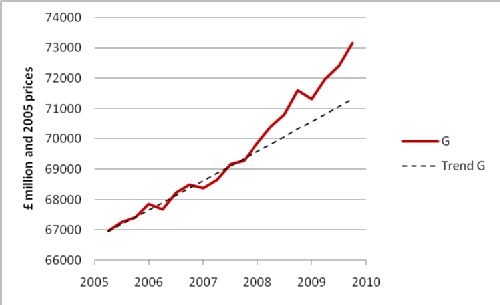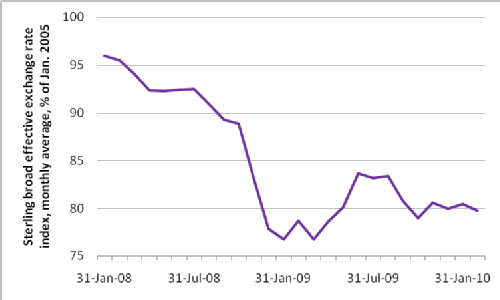The Welfare State: Reports of Death Exaggerated
Writing about web page http://www.direct.gov.uk/prod_consum_dg/groups/dg_digitalassets/@dg/@en/documents/digitalasset/dg_191696.pdf
Panic is in the air, especially in the British public sector. Yesterday's comprehensive spending review prompted BBC Radio CWR to ask me this morning if this marks the end of Britain’s welfare state.
There will be a major contraction, for sure. At the same time, it is far from the end of welfarism as we have known it since the late 1940s. George Osborne’s cuts, if and when they take effect, will bring the government’s share of GDP back down just below 40 percent – that is, where it was in the early 2000s. At that time, less than a decade ago, the welfare state was still alive and well.
What will have changed? Most likely tomorrow's welfare state will be smaller than it is now. And the principles on which it is based are evolving. But given the scale of cutbacks, the evolution of the principles is surprisingly slow.
Principles of the Welfare State
At their simplest, the principles of welfare that were implemented after World War II can be put like this: The state would make minimum provisions for everyone. Coverage would be universal; no one would be allowed to opt out. The insurance provided would be lifelong, from the cradle to the grave. Everyone would contribute according to their means; everyone would get the same low, flat-rate benefits in case of need at any time in their lives.
At first sight, it’s not obvious why we, as a country, couldn’t afford this now and forever. After all, the main changes that have happened since 1950 would seem purely advantageous. On average, we are several times richer now than then. On average we lead longer, healthier lives. What could spoil this?
At the core of the problem is a simple fact: while our lives have improved rapidly, our sense of entitlements has increased out of proportion. This is best illustrated by the problem of pensions.
Why Old Age has Become a Problem
Work produces the wages and profits that are taxed to pay for the welfare state. Since 1950, childhood and retirement have encroached on the years of life in between, during which most people work.
- In 1950, many people left school at age 14. Today, in contrast, many do not enter the workforce until their early twenties.
- In 1950, male retirement was normally at age 67. Today, the average age of men’s retirement has fallen to their early sixties.
- In 1950, most men died before retirement. Only a minority lived long enough to collect a pension. Today, men’s life expectancy has increased to exceed the retirement age by about 15 years.
Old age has become a joy for millions. Free of family chores and work responsibilities, still in good health, our seniors can please themselves – provided they have an income. But the proportion of retirees in the population is rising steadily while the proportion that works to pay for them is declining. It can’t go on.
The government is bringing forward increases in the normal retirement age, one year at a time. It would be more sensible to link these changes to measured life expectancy. For example, if we should expect to spend half our lives working, then the retirement age should rise by six months when life expectancy rises by a year.
From Universal Benefits to the Means Test
The principles of minimum provision and universal coverage are still surprisingly strong in the British welfare state. There is still universal health care that is largely free, and there is free compulsory primary and secondary schooling. There is still a universal state pension with universal pensioner benefits – free TV licenses, bus passes, and winter fuel allowances.
If anything, it is a problem that these benefits are too generous. They are no longer at the low level that made the welfare state affordable in the 1950s. The fault lies largely with the strength of the pensioner lobby – all those healthy voters with time on their hands and nothing better to do than demand more rights.
To me it is a scandal that, over 60, but in good health and in full time employment on a good salary, I'm entitled to a bus pass and a winter fuel allowance. We know winter fuel allowances aren’t spent on winter fuel. These benefits go to millions of people who are neither poor nor fuel-poor. The poor exist, for sure; but the idea of the "fuel-poor" is just a vote-selling scam.
Although the principle of universal benefits is still alive, the British welfare state has always imposed means tests for some entitlements. Their role has been increasing for some time; in fact, as chancellor under Tony Blair, Gordon Brown made important use of means tests to target funding on child poverty and pensioner poverty. George Osborne has now extended the practice, most notably by stopping child benefit payments to higher rate taxpayers.
it seems inevitable that high level income support and care funding will become ever more conditional and selective. This started long before George Osborne and will continue long after him. But the spirit in which it is happening right now owes a lot to the coalition government’s approach to fairness, as I see it.
The Undeserving Poor
The comprehensive spending review claims that the burden of cutbacks will fall disproportionately on the highest income groups. This claim has been criticized already on the grounds that it includes higher-rate income tax increases adopted by the outgoing Labour administration. Actually, it seems reasonable to me for the government to borrow some credit for this. Under better circumstances, surely, Conservative leaders would have liked to reverse the Labour income tax increases. To them, therefore, it was a deliberate choice to retain them. If that deserves a little credit, then let them have it.
Undoubtedly, however, a considerable burden must still fall on the poor. What I see in the spending review is a perspective on fairness that sets out to be fair to one section of the poor: the deserving poor. As for the rest, they are undeserving.
The idea of the undeserving poor goes back centuries; it is not even Victorian, although many Victorians followed it; see Alfred Doolittle’s well known definition.
Who, in George Osborne’s book of morals, are the deserving poor? They are the working parents and the pensioners that worked long and hard to save for retirement. To these will be given. To the undeserving poor, especially the parents that don’t work and the pensioners that took early retirement and didn’t save up for it, the spending review offers only tough love.
Controlling the Consequences
For a country of its size, Britain is said to have one of the most centralized systems of local government finance in the world. A significant paragraph in the spending review cuts away at overcentralization. While central government funding of local authorities will fall by one quarter, most of the ring fencing will be removed, freeing the hands of local councils to decide on local priorities.
Much of the non-cash dimension of the welfare state is decided locally through spending on social and care services, both residential and in the community. The removal of central government controls will increase local discretion over the amount of provision and the rules that say who gets it. And your local councillors, not your MP -- and not George Osborne -- will be to blame.
In Sum
The welfare state is not dead yet; managed prudently, it should last my lifetime and yours. But it will become smaller and less open handed.
Whether it will be more or less fair depends on your standpoint. If you care more about the equality of personal outcomes, then you'll see British welfarism moving away from fairness. If fairness is more about the balance between personal outcomes and personal efforts, however, you'll probably welcome the direction in which we are going.
There will always be unintended consequences. The process of change must create grave risks of harm to vulnerable and needy people. Against those risks is the impossibiity of continuing as we have done.
 Mark Harrison
Mark Harrison

 Please wait - comments are loading
Please wait - comments are loading




 Loading…
Loading…

